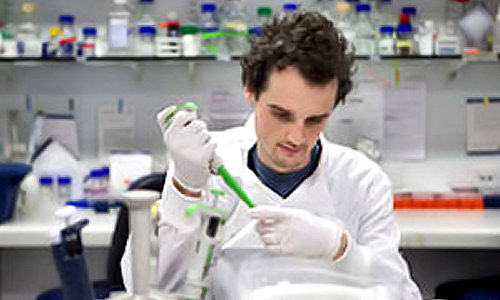Scientists studying cancerous tumour tissues in a laboratory believe they have identified a potential new strategy to treat ovarian cancer.
Recently developed drugs have increased patient survival rates by targeting a tumour’s blood vessels that supply essential nutrients and oxygen to cancer cells.
However, many patients go on to develop resistance to these therapies and grow new blood vessels that spread the cancer again.
A team from The University of Manchester – part of the Manchester Cancer Research Centre – say blocking several avenues that tumour cells use to escape eradication at the same time is now the way forward rather than current drugs, which target only one molecule.
The research gives scientists the opportunity to develop new anticancer drugs that target ovarian tumour growth through the inhibition of the development of new tumour blood vessels.
Ovarian cancer is the deadliest of all gynaecological cancers, and since the majority of patients are diagnosed when the disease is at an advanced stage, prognosis is generally poor. Currently 7,000 women are diagnosed with the disease in the UK each year. Of those, more than 4,000 are not expected to survive but if women are diagnosed earlier 90% of those cases could beat the disease.
Scientists looked at the role of a particular set of molecules in controlling the activity of growth factors, proteins that are responsible for the stimulation of blood vessel growth.
Dr Egle Avizienyte, who co-led the research with Professor Gordon Jayson, said: “We know that a molecule called heparan sulphate (HS) is involved in blood vessel growth through facilitating interactions between the growth factors and their receptors that induce the development of new blood vessels. This is controlled by proteins known as HS6STs which regulate HS structure. By knocking down these proteins – reducing their levels in cancer cells – we were able to reduce activity of growth factors and stop ovarian cancer cells inducing the development of new blood vessels.”
The studies in tumour tissue in the laboratory showed that reducing HS6STs led to a reduction of tumour growth.
Professor Gordon Jayson, who leads the research group, said: “This knowledge gives us the opportunity to develop new anticancer drugs aimed against these growth factors. Targeting multiple factors and blocking several avenues that tumour cells use to escape eradication at the same time may be a better strategy than current drugs, which target only one molecule.”
Story Source:
The above story is based on materials provided by The University of Manchester, Alison Barbuti.





